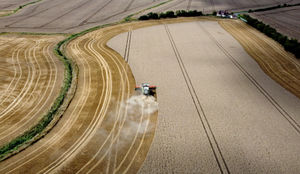Green groups back farmers calling on Government to ‘fix’ agriculture sector
Dozens of green campaigners are calling on the Government to support farmers and address the “broken” state of England’s agriculture sector.

The Wildlife Trusts and WWF are among numerous groups who have signed a letter to Environment Secretary Steve Reed raising the alarm about what they describe as unfair supply chains and funding for nature-friendly farming.
Thousands of farmers are expected to descend on Parliament on Wednesday for further protests as anger continues over the Government’s proposed changes to inheritance tax rules on agricultural property and land.
British farmers have described the move as the “final straw” after years of tightening margins driven by rising costs, climate-change impacts and market pressures from imports.
Extreme weather across the UK in recent months also contributed to one of the worst harvests on record.
Nature campaigners said the proposed tax changes came as a political flashpoint for a sector struggling with deep-rooted challenges.
“Farmers feel undervalued, overburdened and unsupported in their efforts to embrace a transition to nature-friendly farming. This should concern us all,” they wrote in the letter sent on Monday.
“This moment lays bare the deep systemic issues that have dogged England’s agricultural transition.
“From an unjust food system to inadequate investment in nature-friendly farming, the root causes must be addressed.”
The letter raised concerns about a power imbalance in supply chains that favoured major retailers and left farmers with little negotiating clout.
Farmers often earn less than 1p for every pound spent by consumers, the campaigners said, adding that unfair contracts, supermarket pressures and exploitative practices were stifling their ability to invest in nature-friendly farming.
The campaigners called for the Government to reform the groceries code adjudicator – a trade policy that aims to provide a level playing field for domestic farmers and businesses through a set of minimum environmental thresholds for imported agri-food products.
They also said years of underfunded environmental land management schemes (Elms) – which replaced old EU-era subsidies with payments based on nature-friendly farming methods and habitat creation – threatened “our shared vision of a sustainable future for farming”.
They pointed to a current pause in capital grants and a legacy of design flaws in the Elms programme, saying the Government needed to better resource and target subsidies, and ensure adequate funding to support sustainable farming.
In the Budget, the Government maintained farming spending at existing levels for the next two years – so £2.4 billion for 2024/25 and 2025/26, as well as £200 million underspend from previous years.
But the campaigners called for ministers to increase the annual farm budget to £3.1 billion in England at the upcoming comprehensive spending review to support nature-friendly farming, safeguard livelihoods, improve animal welfare and meet critical climate, nature and water targets.
“Without decisive investment and a clearer plan for delivery, farmers risk being caught between a lack of market access and inadequate support for sustainable transitions,” the letter said.
Richard Benwell, chief executive of Wildlife and Countryside Link, said: “With so much at stake for farmers and the environment, the Government has a chance to fix things.
“The Prime Minister should pledge the public money needed to grow a green and thriving farming economy that can help reverse nature’s decline and provide security and stability for farming communities.”
Vicki Hird, strategic lead for agriculture at The Wildlife Trusts, said: “Without these changes, we will likely see further declines in wildlife, loss of soils, more water pollution and unmanaged flooding.
“A coherent farming and food road map aligned with a strong environmental ambition and budget, cannot come soon enough.”
Angela Francis, director of policy at WWF, said: “British farmers must be at the heart of any serious action on nature, climate, and sustainable food production.
“Yet too often, farmers feel they are being asked to bear the brunt of fixing a broken system.”
Signatories also included almost 50 representatives from groups such as the RSPB, Greenpeace, Soil Association, Real Farming Trust, Landworkers’ Alliance, Pesticides Action Network, River Action, People’s Trust for Endangered Species, Compassion in World Farming, RSPCA and Plantlife.
An Environment Department (Defra) spokesperson said: “Our commitment to the farming sector is steadfast, and we are investing £5 billion through the farming budget over two years – the largest amount for sustainable food production and nature’s recovery in our country’s history.
“Over 60,000 agreements for our Environmental Land Management Schemes are now live and we will continue to evolve and improve them to support farmers, sustainable food production and nature recovery.”




